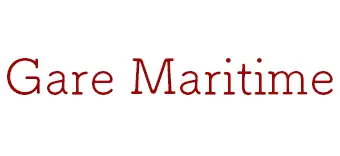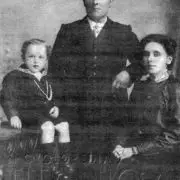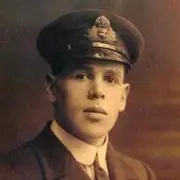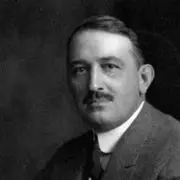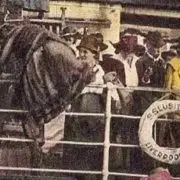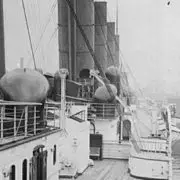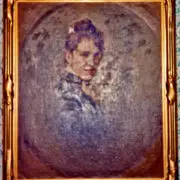The Lusitania : Part 7 : Passengers of Distinction
Albert Norriss Perry was another Lusitania passenger with ties to the fledgling automotive industry. His future looked bright in May 1915. Perry had been in the auto business, in London, since 1903, and he had just secured a position with Pierce Arrow, one of the top three luxury car companies in the United States.
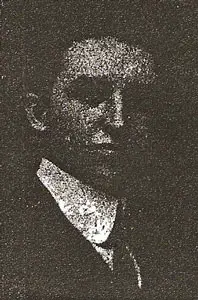
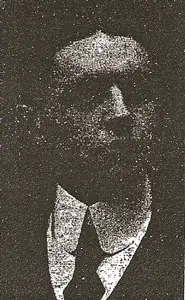
Albert and Frederick Perry
Perry was born at home on May 17, 1889, at 31 Mayton Street, Islington. His father, Charles, was a prison warden and his mother, Julia Norris Perry, stayed at home to look after the small but growing family. Albert left school at the age of 14, and started working at Messrs Napier & Son, Motor Manufacturers of Acton Vale and New Burlington Street, London. He had become a Sales Manager with the firm by 1910, and visited America for the first time that year. He met and became engaged to 26 year old Jessie Couper, of Gretna Vale, in 1911, and on June 15, 1912, they married in the Parrish of East Acton, Middlesex. Their only child, Ruth, was born at home on February 26,1914.
Perry remained employed by Napier, and by the time the couple moved to 51 Grafton Road, Acton, Albert was already one of their most popular Sales Managers. Napier & Son, while continuing to manufacture motor cars, also began producing aero engines on behalf of other companies.
Albert sailed to America, in early February 1915, accompanied by his younger brother Frederick “Fred” Perry. Their destination was Buffalo, New York, where Albert would take up a position with the Pierce Arrow Company. Pierce Arrow, along with Packard, was America’s leading producer of hand-assembled luxury cars, and was endowed with an aura of prestige equivalent to that of Rolls-Royce.
The brothers boarded the Lusitania, destination- Liverpool, on May 1st. Albert N. Perry was to reunite with his family, and his wife and daughter would be returning with him to America on the Lusitania‘s next voyage, on May 15th.
Albert Norriss Perry drowned, but his brother, Frederick John Perry, survived and gave his account of the disaster to a reporter of the Acton Gazette on May 14,1915:
Both my brother and I were returning from the states together. Before we left New York we read in the papers the notice issued by the German Ambassador, and as everybody else did, we pooh poohed the idea of the vessel being torpedoed. There was a general discussion of the matter throughout the whole of the morning. There was a great crowd at New York to see us all off, and as the ship began to move away from the landing stage the splendid Welsh choir which had been touring the States sang to their friends on shore.
That and all the following days up to the day of the disaster were beautifully sunny. We had a very good voyage over. On the Thursday evening before the sinking of the vessel, we had the usual weekly concert among the first class passengers and after a splendid entertainment by the Welsh choir, the chairman, who was one of the director’s of Messrs Vickers, made a splendid appeal for the Liverpool Sailors Orphanage and referred to the dangers through which we were passing. He said that he was quite sure that every man, from the Captain down to the stokers would be willing to lay down their lives for the passengers if need be. This resulted in a record collection at these concerts for the Liverpool Orphanage.
On the following morning, quite early before anyone was about, the fog horn was sounding and it continued sounding up to 12 noon. It certainly was misty, but in view of the danger zone we were in it seemed a trifle absurd to blow the fog horn furiously as they were doing. At noon it cleared, the sun shone beautifully and one could see for miles. The south coast of Ireland was well in sight. At one o’clock the lunch bugle sounded and everyone went down to lunch.
My brother, an American friend who was traveling with us for his health and who intended to return with my brother on the Lusitania next Saturday as my brother was taking up a permanent position with the Pierce Arrow Co, were lunching with me, and as we were finished quite early we went up several decks to the lounge for a smoke. It was then ten minutes to two. Shortly after two o’clock, just before the people began to get up into the saloon there was a terrible impact, marked not so much by the noise as the force of the explosion. It shook the vessel from stem to stern as though we had struck a rock or collided with another vessel. We immediately realized that we had been hit by a torpedo.
Our American friend was not with us at the time, but my brother and I walked through the lounge to get down to the boat deck. We were met at the entrance to the lounge with a fearful volume of smoke and steam, caused by the explosion, which apparently had reduced the speed of the ship very suddenly. Before we could realize the position, there was a second shock, which came within a minute or two of the first. By this time there were many people coming up the stairs from the lower decks and the dining saloon. We managed to get out onto the boat deck, which was then very crowded, considering the majority of the people had been in the dining saloon. Most of the people appeared to have come from the second saloon over the communicating bridge. My brother and I then got separated, nor did I see our American friend, Mr. Brown who had gone down into the library after dinner to write some last letters before landing.
I walked to the starboard side and helped people get into the boats. One boat was being lowered, but when it was nearly half way down one end seemed suddenly to stop, and the other end continued with the result that the people – between fifty and seventy of them – were simply shot out, like coals out of a sack, into the water. The boat then followed them down to the water, stern foremost, and thus immediately began to fill with water. The bows seemed to be held fast by the ropes, which were still over the davits. The boat thus lay useless alongside the ship.
Another boat further along towards the captains bridge was lowered a few seconds afterwards and when nearly down to the water it appeared as though it was going to behave as the first had done, but righted itself and reached the water safely There were not more than half a dozen people out of the previous boat within reach of the second. They were told to catch hold of the second boat, but I did not see whether any managed to get in or if I did see, I don’t remember it. I remember that one of the difficulties of lowering the first boat was that an iron ring had jammed round a staple and one of the crew could not release it.
I jumped into one of the boats to help in releasing the ropes preparatory to filling it with the women who were round, when I suddenly heard a cry “All out of the boat”. Looking round I saw an officer on the very top deck of all, but could not hear his orders distinctly. Immediately we jumped out onto the boat deck and then it appeared that the ship was simply righting herself, probably through the water finding its own level, and I suppose the watertight doors were closed. I then saw my brother for the last time, away towards the captain’s bridge and near the lounge entrance. I notice he was, like myself, fully dressed, but had on a lifebelt of the kind supplied in each cabin. I asked him where he had obtained it, and he said, “Inside the main entrance,” I looked in and found there were a large number of saloon passengers there, all with belts on, including some of the ships officers. Not seeing any belt lying about and not caring to run the risk of going down to my cabin and being caught like a rat as the ship went down, I went on deck.
Then the ship made another lurch to starboard, the side on which it had been torpedoed. With this I made for the boat deck again. I obtained one of the white cork life-belts, but gave this up later to a boy of about eight who was running along the deck and put him into a boat. The ship was now sinking fast. It appeared to me we should never get a boat away and that even if we reached the water, the ropes would not be detached. I decided to wait until the water reached a certain porthole and when it was a case of “everyman for himself” to dive overboard. This I did from the port side which was of course very high in the air. I dived striking the boat which had previously emptied the people into the water.
After an awful struggle in the water too awful to describe I came to the top fighting for something to get hold of. After a few seconds I saw a boat near me and immediately made a plunge forward to get hold of it, but was quickly pushed off by some stokers, who declared “There’s no room for a single person.” I was thus back again in the water, but made a second effort to get hold of the small ropes looped round all the boats. I gripped so tightly that you can see the marks on my fingers now. Thus I was pulled along by the boat for some considerable time. When I was giving out I put an arm through one loop for better support.
I was taken out of the water about 4.30 pm, having been in it for two hours according to the time at which my watch had stopped. I was rescued by a small fishing boat, and the fishermen were very kind, giving me some hot tea. After waiting for about an hour, we were taken off by paddle steamer and arrived in at Queenstown at 9.20pm. We were very kindly treated there and I was taken to the hospital. I should like to say that there was no panic at all.
When I saw the people on the boat deck everyone seemed to be struck with grief rather than fear. Ladies and children were crying, but not screaming. This was really marvelous to me considering the time the people had been thinking what might happen to them. No, I cannot say whether the little boy I spoke of was saved or lost. Nor do I know if a gentleman I knew, Mr. Nedbury, (Medbury-author) a Surrey man was saved, but I do not see his name on the list of survivors. I did not see the ship go down, but I think it had gone when I came to the surface. I seemed to be an awful time fighting in the water, but after I had risen the second time I seemed to know that I had got to strike out. I can only just swim and could not have reached the boat if it had been any distance away. My elder brother, Norriss is an excellent swimmer, I never saw him again after he was at the lounge entrance. I have heard today that his body has been recovered and is being sent over from Queenstown to Acton for the funeral which will take place at St. Dunstan’s Church and Acton cemetery, if possible on Saturday afternoon.
I returned from Queenstown only today. I have been lying in the Queen’s Hospital Queenstown, with a broken collar bone, bruised legs and arms and a bad back. My brother Harry, though he had no address to work upon, came over to Queenstown to find me and brought me back at three o’clock yesterday afternoon and we arrived at Euston at six o’clock this morning. I have been examined by a local doctor and I think I am fortunate to get off so lightly. It is appalling to realize the exceptionally large number of women and children who have been brutally sent to their deaths by a country calling itself civilized.
Albert Norriss Perry’s body was one of seven recovered by the skipper of a trawler and brought ashore at Castletownshend. The bodies were move to Queenstown, where Perry was identified by the contents of his pockets. Observers noted that Albert’s eyes were closed but swollen, indicating some sort of blow to the head. Albert Perry was listed as body #162:
Well dressed male, 30-35 years old, 5’10, and clean shaven. Auburn hair, stout, wearing a pale green suit, white shirt with black stripe, brown golf shoes. Property: Diamond ring on finger, invest pocket a gold half hunter keyless watch-stopped at 2.35pm attached to a gold kerb chain, small links, I leather sovereign purse containing 2 gold sovereigns plus £8,10s in English currency and $180.00 in dollar bills, and two 1st class tickets from Liverpool to London and a silver cigarette case bearing an inscription showing that it had been presented to him by “a few colleagues of Messrs. D Napier and Son” and dated Xmas 1914, some letters were also found on him, one addressed to Mr. G.F. Heath, Heaths Garage Ltd, John Bight Street, Birmingham, and another addressed Gerald Dugdale Esq., 8 Market Place, Manchester.
Albert’s body was returned to Acton on May 14th, with his funeral taking place the next day at St Dunstan’s Church. The internment followed at Acton Cemetery, next to the small chapel by the entrance gates. Those in attendance included his widow, Jessie, his parents, and his brothers, John and Harry.
An application for probate was granted on July 19, 1915, on behalf of his widow and daughter. Albert’s estate was valued at £10, 493, 14s, 4d.
Jessie Perry’s younger brother, James, died on June 6, 1955,. Albert’s grave was reopened and her brother interred with him. Frederick John Perry continued to work for Napier & Son until his retirement. Frederick moved to a nursing home in Sunninghill, Berkshire after the death of his wife, Violet, and passed away peacefully on January 25, 1971 aged 85.
Napier & Sons continued to produce motorcars until 1924 when it switched production to aircraft engines, eventually closing its doors in the early 1960’s. Pierce Arrow maintained its reputation for flawless, hand-crafted luxury, but ultimately could not survive the Great Depression. A handful of 1937 models were assembled, and it is possible that one or two 1938 Pierce Arrows may have been produced before the company vanished.
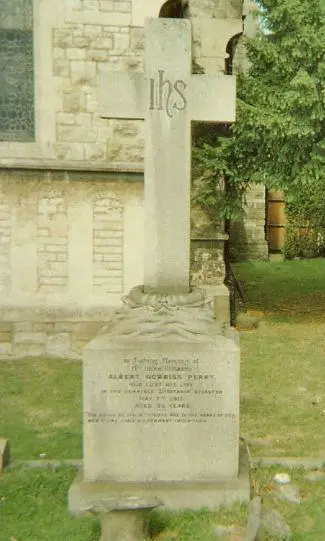
Albet Perry’s Grave
